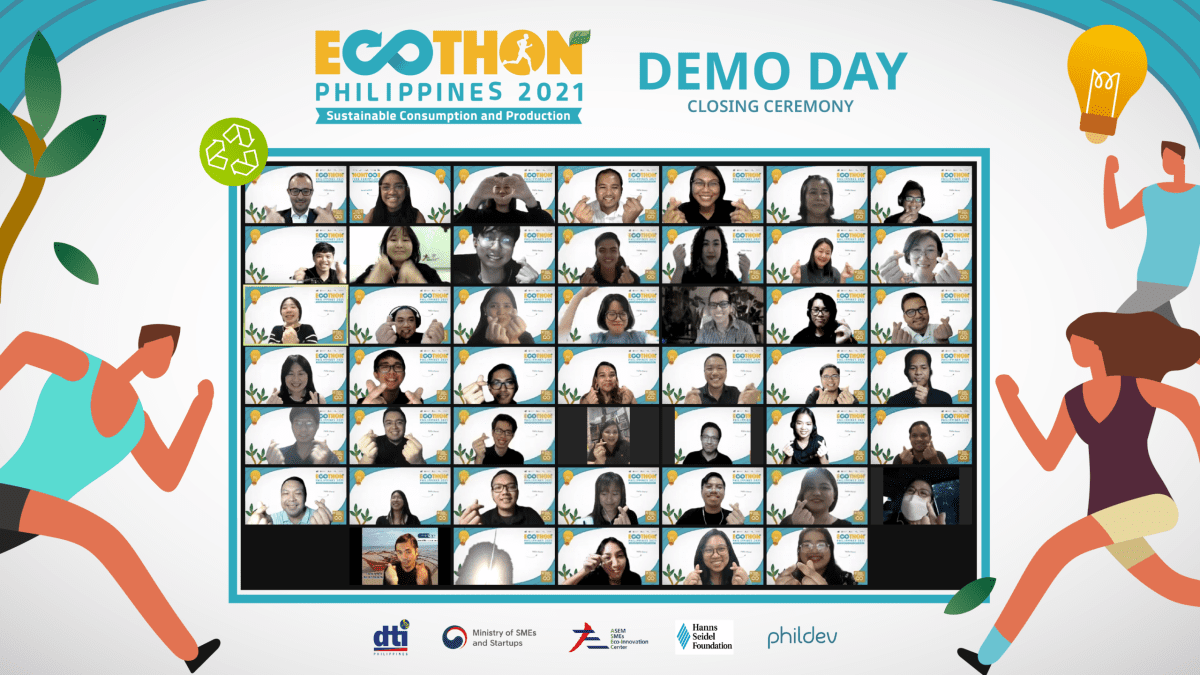By Adriel Nisperos
MANILA, Philippines – The Philippines’ first Ecothon awarded KRW 3 million grants to four tech startups in a demo day held on 29 October 2021 to culminate the 4-day learning event, via online streaming.
Launched last September 2021 in the Philippines, Ecothon is an ASEAN-wide hackathon that aims to discover and support innovative solutions advancing the United Nations Sustainable Development Goal 12: Sustainable Consumption and Production. The hackathon was conducted in collaboration with the Department of Trade and Industry (DTI), the Ministry for SMEs and Startups of the Republic of Korea (MSS), the ASEM SMEs Eco-Innovation Center (ASEIC), Hanns Seidel Foundation, and PhilDev Foundation.
[READ: PH launch Ecothon 2021: Online Hackathon for the Best Sustainable Solution]
“The Department of Trade and Industry actively provides support to the growth of startups as they drive our digital economy through key initiatives such as the Philippine Startup Development Program which aims to support the incubation and acceleration of startups, as well as exposing and connecting them with startup ecosystems abroad,” Dr. Rafaelita Aldaba, DTI Undersecretary for Competitiveness and Innovation, shares.
Michael Siegner, Regional Representative of Hanns Seidel Foundation, shared Ecothon’s focus on startups in the SCP field, “I sincerely believe that you [startups] and your counterparts in other ASEAN countries can be the champion of building back a better and greener approach in ASEAN in the post-COVID world.”
The four startups that won the hackathon integrated and pitched low to deep technologies in responding to the challenge.
AniTech emerged as the hackathon’s champion and received a KRW 1.5 million grant. AniTech is a tech startup developing a smart gas sensor system and platform which monitors the freshness and spoilage of agricultural products from the post-harvest stage up to storage and distribution.
Winning second place is Phinix, a startup that collects textile wastes and transforms them into higher-valued products. Phinix pitched Storx, an alternative bubble wrap packaging made of mixtures of waste aimed to reduce plastic waste. The startup received a KRW 1 million grant for their innovation.
Social startup Kakawani, on the other hand, received a KRW 500,000 grant for finishing third in the hackathon. Their startup upcycles cacao wastes for food and beverages, providing sustainable livelihood for women cacao farmers and the community in Angalan, Davao City.
A special award for the startup’s innovativeness was also given to The Good Flies, a rising startup that converts organic waste into feeds using a Black Soldier Flies Rearing Technology.
Dr. Choong-lai Cho, Secretary-General of ASEIC, shared how the shift towards sustainability is an emerging trend, “Nowadays in the 2020s, we face a new era, a new paradigm: sustainability. We live in an era where technology and products are not the only source of value creation. Therefore, we must constantly seek, discover, and innovate new business models.”
[READ: Ready, Set, Go Sustainable!: Join the race towards sustainable consumption and production]
Ecothon’s focus is also on supporting tech startups which can further accelerate sustainable development. Dr. Eric Tomacruz, Executive Vice-Chairman at PhilDev Foundation, shared the role of innovations in solving problems, “Coupling [the] sustainability mindset with innovation and technology, startups are able to create a significant impact in the country especially when further developed into globally competitive businesses. We hope to continuously contribute to the development of the local startup ecosystem and provide opportunities for Filipinos to thrive.”
Aside from winning grants, the teams will also be representing the Philippines in the upcoming COMEUP 2021 event during the Korean Startup Week this November, plus other follow-up support programs supported by the Korean government and ASEIC. To learn more about Ecothon and the winning startups in the Philippines, visit www.ecothon.net

